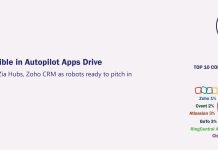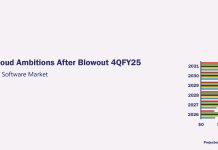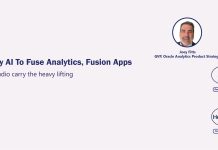After more than a year of reinvestment and redevelopment efforts, Unit4 is upping the ante with a new platform that could boost its standing in the ERP applications market.
The ERP applications vendor is launching a new branding campaign along with the release of a number of enhancements for its pillar products, following the $1.5-billion purchase of Unit4 by private equity firm Advent International, which has pumped tens of millions of dollars in additional investment since the 2013 acquisition.
The new Unit4, as opposed to UNIT4 in the past, is highlighting its People Platform as the engine that could propel key verticals like professional services and public sector by addressing two fundamental but often conflicting requirements:
- to master the complex and dynamic environment that define organizations in the services sector and
- to deliver a user experience that’s relevant and simple at all times.
The People Platform achieves this by introducing a common foundation that easily extends to all modules, reports and workflows and serves as the information vehicle that automatically adapts to changing data structures in order to handle end to end functional requirements from project management to expense control, and from budgeting to requisitioning.
A second layer of the People Platform – Smart Context – serves as another key differentiator and has the purpose of contextualizing information so that it can be easily incorporated into social conversations, real-time communications and even predictive analytics, all of which contribute to free users up from administrative burdens and help them to work smarter irrespective of the device they use to get the job done, being it a PC, laptop, tablets, smart phones or even their watch.
Instead of being inundated by oftentimes irrelevant information and outdated data, Unit4 users could see overall productivity gains because of their ability to harness contextual exchanges, perhaps preparing them with industry insights and meaningful business references that give them a more engaging workplace experience.
In addition, Unit4 is emphasizing flexible Cloud delivery options, putting the power of instantaneous information access in the hands of line of business executives and regular users. Rather than ceding the control of such systems to a handful of people in the IT shop, Unit4 is making it possible for average users with diverse backgrounds and requirements to run the same application in a public cloud, private cloud, or on-premise. They can even move between these deployment options.
Much of the changes center around the latest releases of Unit4 Business World(formerly Agresso) Milestone 5 and Unit4 Financials(formerly Coda) V13, both of which have been adapted to the People Platform by giving them plenty of shared properties including Smart Context and a consistent look and feel.
Enhancements that come with Unit4 Business World Milestone 5 include improved capabilities for team collaboration, budgeting, appraisals(performance management), payroll, and procurement. Unit4 Financials v13, on the other hand, features enhanced user interface, Flexifields and Smarter Analysis with the help of the latest in-memory analytics technology.
Upgrade Path
In order to reap the benefits of the People Platform, customers are encouraged to upgrade to Unit4 Business World Milestone 5, which is positioned as the go-to-market product for years to come. As Unit4 starts rolling out a series of new applications based on the People Platform as well as pilot customers with replicable use cases, the vendor is also charging ahead with Cloud expansion.
In 2014 Unit4 was able to muster a 7% rise in total revenues to €525 million. That compares to a 4% increase in 2013. While the single-digit gain paled that of some of the best-of-breed Cloud applications upstarts that doubled or tripled their sales in 2014 one needs to be fair and compare apples to apples. Unit4 has a large portion of revenue which is based on maintenance income from software sold years back, plus it has a sizeable consulting business which the company decided to grow slowly in order to give partners the opportunity to step in and offer additional services to the Unit4 customer base. Looking at Unit4’s Cloud business, bookings grew rapidly with 60% of orders coming from its Cloud applications in recent quarters.
The future of Unit4 will be driven by adoptions of the People Platform among its core constituents such as government agencies, professional services firms, higher-education institutions and nonprofit organizations. The first two groups, which account for more than one-third of its installed base of 30,000 customers, will have to take their upgrade plans seriously if they were to take advantage of advances in user interface, flexible configuration, and in-memory database.
Jose Duarte, CEO of Unit4 since June 2013, explains the implications of People Platform this way: “Setting this standard for all our innovation efforts will make enterprise applications in the future ‘drive’ by themselves when they can, and take initiative when they should, leaving people to focus on serving customers.”
There are two versions of Unit4’s People Platform with the Foundation release already available and the Enterprise Edition shipping at a later date. And Unit4’s transformation may not be fully evident until People Platform Enterprise Edition hits the market, along with a raft of industry-specific applications that form the backbone of Unit4’s expanded product portfolio.
Like many ERP vendors, Unit4 is at a crossroads harnessing strength from its vast installed base, while upping the ante to drive Cloud adoptions through new technologies such as the People Platform. For its customers, the issue is a classic chicken or egg question. Should they upgrade now and be among the first to influence Unit4’s future direction, possibly ensuring different flavors of People Platform as well as its new applications will be able to meet their current and future needs? Or should they wait for others to work the kinks out of the new platform?
While most other ERP customers have faced similar dilemma, the upshot for Unit4 and its customers is its long track record of providing an agile platform that can be easily configured by the business users to accommodate such business changes like mergers and acquisitions without requiring wholesale replacements of one’s ERP back-end, or for that matter heavy involvement of the IT shop to overhaul one’s system landscape. The same attribute, which appears to be a recurring theme in People Platform as well, may work in favor of Unit4 once again.






